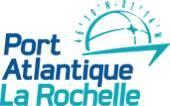Industrial and territorial ecology in the La Rochelles port community

Reprocessing waste to make it into a resource: this is the purpose of industrial and territorial ecology, one of the pillars of the circular economy. The advantages are twofold: increased competitiveness for companies by reducing costs, and better protection of the environment.
In office since May 2 on behalf of the Union Maritime and Port Atlantique La Rochelle, the industrial and territorial ecology group leader is running the special initiative begun in the port community.
Industrial and territorial ecology: concept or reality? Rémi Justinien got straight to the point: "For the moment, it's a concept. But my mission is for it to become a reality, for the port community to commit and make a success of the energy transition in a context of scarcity of resources and rising raw material costs. The challenge is a big one: in order to keep the Earth habitable, we can no longer produce tomorrow as we did yesterday. This is not the responsibility of a minority, and must now come to terms with the idea of progress by putting into practice the fundamental principle of circular economy in which nothing is lost, and everything is transformed. "
The bar is high, and the objective ambitious: "I ultimately see La Rochelle as a Green Port, standing out on the map of France with a distinction worthy of the twenty-first century, deeply involved in a sustainable development initiative, in accordance with the Charter of the same name initiated by the port community". Feedback that he is getting from in the field is pretty stimulating. "Company directors in the port community are motivated and aware of their responsibilities. They are highly involved and respectful of the La Rochelle area that was a pioneer in urban ecology with the famous yellow bikes forty years ago and self-service electric cars in the nineties".
While some people are already practising industrial and territorial ecology without necessarily realising it, we still need to coordinate the initiative in order to create synergies, boost cost reduction and initiate ever-more environmentally friendly innovative solutions. This initiative became operational with the recruitment of the group leader. But there had been a preamble to it. In November 2014, the Union Maritime and the Port jointly responded to a call for expressions of interest for industrial and territorial ecology in Poitou-Charentes, piloted by ADEME and the Region. Thirteen candidates were chosen and four winners selected, including the Maritime Union and the Port, alongside the Haute-Saintonge inter-communal authority, the Niort urban community and the Bocage Bressuirais urban community.
"Among these winners, the La Rochelle port community is the only entity not to be a public authority and this is significant. This reflects the determination of the directors of the Union of Maritime and the Port to bring what is nevertheless an industrial site into the energy transition, innovating to continue to protect the environment while maintaining activity and employment".
An operational action plan
The industrial and territorial ecology group leader of the port community spent this summer diagnosing flows with the consultants Girus from Nantes, specializing in circular economy. Based on individual interviews with company officials, Rémi Justinien has been working to define the volume and type of waste produced, the volume of water consumed, the raw materials needed and what happens to them once the industrial process is complete. This is a necessary step before identifying possible synergies that are expected to be shared with the people involved in November or December. "If we identify possible solutions more quickly, we will start to implement them before the end of the summer. We want to be practical".
By 2017, an action plan will be deployed and new cycles begun for one man's waste to become another man's resources on a permanent basis. For the idea of this experimental approach is that it should endure over time.
Previously project manager at the Ministry of Ecology, Rémi Justinien is familiar with the problems of energy transition. For two years, he identified good local environmental initiatives and helped to create the labels Territoire zéro déchets (Zero-waste Land) and Territoire à énergie positive pour la croissance verte (Positive energy land for green growth). Rémi takes his commitment to the environmental cause from his origins in the Haute Vienne département and the Millevaches plateau where was born 29 years ago.